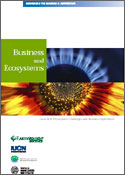Business Must Adapt to Realities of Earth's Ecosystems, Warns New Publication
 Oxford, UK - A new publication warns that companies must transform business models and operations if they are to avoid major economic losses caused by the current degradation of ecosystems and the vital services they provide.
Oxford, UK - A new publication warns that companies must transform business models and operations if they are to avoid major economic losses caused by the current degradation of ecosystems and the vital services they provide. Ecosystem Challenges and Business Implications, produced by Earthwatch Institute (Europe), the World Conservation Union (IUCN), the World Business Council for Sustainable Development (WBCSD), and the World Resources Institute (WRI), is based on global scientific facts and projections from the UN’s multi-year Millennium Ecosystem Assessment and interviews with a range of business leaders to assess the implications and strategies needed to respond to environmental challenges.
This research indicates that many companies recognize the risks associated with degrading ecosystems and are trying to adapt accordingly, but most fail to associate healthy ecosystems with their business interests. A collective business response is therefore needed to address the scale of environmental change currently taking place.
The publication offers a detailed examination of the implications that water scarcity, climate change, nutrient overloading, biodiversity loss, habitat change and the overexploitation of oceans will have for the future of business. These include scarcity of raw materials, higher operating costs, government restrictions and reduced flexibility. It further cautions companies to prepare for these risks by measuring their impact and dependence on ecosystem services, taking advantage of emerging business opportunities and reducing their operational footprints.
WBCSD President Bjˆrn Stigson says, “Business simply cannot function if ecosystems and the services they deliver - like water, biodiversity, food, fiber and climate regulation - are degraded or out of balance. There must be a value attached to natural resources, and businesses need to start understanding this value.”
The publication partners urge companies to pursue solutions that will help to conserve ecosystems, such as new energy efficient technologies and products, new businesses to undertake habitat restoration, and new markets, such as nutrient trading.
“Human impact on the natural environment has quickly led us to the limits of the earth’s carrying capacity,” says Nigel Winser, Executive Director of Earthwatch Institute (Europe). “Business, working in partnerships and by transforming current practices, must be part of the solution.”
Janet Ranganathan, Director of the People and Ecosystems Program at the World Resources Institute, continues, “Leading businesses have always adapted to new realities. The new reality is that ecosystems are losing their ability to produce some of what businesses value most.”
The companies interviewed for this publication include Interface Europe, Skanska, Syngenta, Novozymes, Unilever, Rio Tinto, Mondi, Shell, Thames Water Utilities, Novo Nordisk, SAB Miller, Reed Elsevier and Cadbury Schweppes.
The publication is the first of three to be produced by the four partners. The second will focus upon how new business models, markets and entrepreneurs can profit from responding to ecosystem challenges and the third will help business executives identify their dependences on ecosystem services and ways to retain them for the long term.
Source: World Business Council for Sustainable Development (WBCSD)
You can return to the main Market News page, or press the Back button on your browser.

